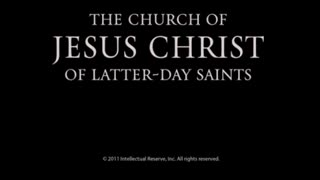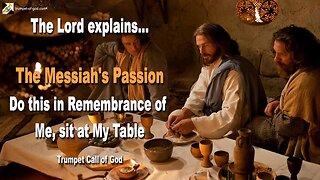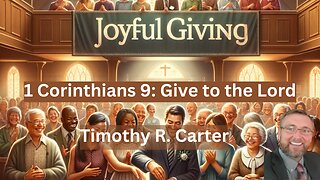Honoring God with Our Best | Nehemiah 10:32-39
We also take on ourselves the obligation to give yearly a third part of a shekel for the service of the house of our God: for the showbread, the regular grain offering, the regular burnt offering, the Sabbaths, the new moons, the appointed feasts, the holy things, and the sin offerings to make atonement for Israel, and for all the work of the house of our God. We, the priests, the Levites, and the people, have likewise cast lots for the wood offering, to bring it into the house of our God, according to our fathers' houses, at times appointed, year by year, to burn on the altar of the Lord our God, as it is written in the Law. We obligate ourselves to bring the firstfruits of our ground and the firstfruits of all fruit of every tree, year by year, to the house of the Lord; also to bring to the house of our God, to the priests who minister in the house of our God, the firstborn of our sons and of our cattle, as it is written in the Law, and the firstborn of our herds and of our flocks; and to bring the first of our dough, and our contributions, the fruit of every tree, the wine and the oil, to the priests, to the chambers of the house of our God; and to bring to the Levites the tithes from our ground, for it is the Levites who collect the tithes in all our towns where we labor. And the priest, the son of Aaron, shall be with the Levites when the Levites receive the tithes. And the Levites shall bring up the tithe of the tithes to the house of our God, to the chambers of the storehouse. For the people of Israel and the sons of Levi shall bring the contribution of grain, wine, and oil to the chambers, where the vessels of the sanctuary are, as well as the priests who minister, and the gatekeepers and the singers. We will not neglect the house of our God.” — Nehemiah 10:32-39
CALL OUT: To Tony Wendt, one of our subscribers and financial partners from Neenah, WI. Thank you for your partnership in the Gospel.
As I mentioned two days ago, the section from verses 30-39 lists specific changes the people agreed to make as a community with God. I have broken these down into three parts:
Marital Purity (Nehemiah 10:30).
Sabbath Renewal (Nehemiah 10:31).
Temple Priority (Nehemiah 10:32-39).
Today, we will focus on the third tenet of their rededication, their recommitment to Temple Priorities.
There are a lot of details in this text. Many of them might seem a little foreign to you. So, let me break them down for you.
The first two verses here address the Temple Administration. These were monies used for operational needs in service to God.
Shewbread: These were 12 loaves of bread made of fine flour prepared for the golden table every Sabbath day.
Regular Offerings: These included grain offerings and burnt offerings. They were part of daily rituals to honor God.
Special Offerings: These offerings were made on special days like the Sabbath, New Moon festivals, and other religious feasts.
Holy Offerings: These were special offerings dedicated to God.
Sin Offerings: These offerings were made to seek forgiveness for sins.
General Temple Upkeep: The tax was also used for the maintenance of the temple and its properties.
The rest of the verses address the First-Fruit Offerings.
In the Law of Moses, "First-Fruits Offerings" were the first portion of crops and produce that were harvested by the Israelites. These were offered to God as a sign of gratitude and acknowledgment that the land and its produce belonged to Him. They were:
Symbols of Gratitude: The offering of the first fruits was a way for the Israelites to express their thankfulness to God for the fertility of the land and the harvest. It was also an acknowledgment that everything they had came from God.
Offerings for the Temple: These first fruits were brought to the Temple and presented to the priests. The offering included various types of produce, depending on what the individual had harvested.
Supplies for Celebrations: The offering of first fruits was often associated with their religious festivals, like the Feast of Booths, which they had just celebrated.
Presentation of God's Best Provision: By offering the first and best of their produce, the Israelites showed their trust in God's continued provision. It was an act of faith, given that they offered these first fruits before the full harvest was gathered.
The first fruits were a tangible way for the people of God to participate in worshipping something greater than themselves. They were tangible reminders of their dependence and need for the provision of God.
Two applications here.
First, we should always give God the best of our time, talent, and treasure. We all should. As your pastor and teacher, I should give you my very best. But you should give your very best as well. The believing body needs each other, and we should all bring to bear in the community our very best to help administrate the regular and daily work of the Lord.
The things I do here don't just happen. Some people join with me to make it happen. I have a finance team, website team, prayer team, volunteer team, publishing team, planning team, and videography team. In fact, [shameless plug 😬] I am currently looking for someone with some video-editing/social media skills. When all these things work together, God uses us to reach his people for his kingdom and glory.
Second, we also give our first and best to keep our pleasures subject to God's ongoing provision. Every believer will always struggle with selfishness and pride, but the first-fruits principle is a full frontal attack on this. The first fruits practice keeps our pleasures pointed at God's pleasures. Giving our first and best requires us to regularly submit our selfish desires and prideful passions to God and his priorities, plan, pleasure, and provision. Therefore, when we give God "our best," we recognize that this is an output of "his best," which is a gift to us; we are only allowed to steward, which keeps us dependent on his goodness.
So, do me a favor. Like I give my best to the body, I want you to give your best to the body today. This could be your family, a group, or your church. But give for their benefit, your benefit, and God's glory.
#SabbathRenewal, #Nehemiah10, #FaithInAction, #GodsCommandments, #ModernFaith, #RestAndWorship, #BiblicalPrinciples, #ChristianDiscipline, #SpiritualGrowth, #DailyDevotion
ASK THIS:
How can we apply the principle of Sabbath renewal in our contemporary lives, especially considering the challenges of modern work and technology? Reflect on ways you can integrate rest and worship into your weekly routine, honoring God amidst a busy lifestyle.
In what areas of your life might you be tempted to dismiss certain biblical teachings as culturally irrelevant, and how can you actively engage with these Scriptures instead? Discuss how the commitment of the Israelites to adapt and uphold God's commands, despite changing circumstances, can inspire us to find relevant applications of biblical principles in our daily lives.
DO THIS: Let Scripture convict you and change you.
PRAY THIS: Lord, help me to honor Your Scriptures in a way that is true to Your Word, and give me the wisdom to apply its principles in my daily life, reminding me of the importance of rest and worship in my relationship with You. Guide me in living out Your teachings faithfully, even when they challenge the norms of my surroundings, so that my actions may reflect my commitment to You. Amen.
PLAY THIS: Faithful.
CALL OUT: To Tony Wendt, one of our subscribers and financial partners from Neenah, WI. Thank you for your partnership in the Gospel.
As I mentioned two days ago, the section from verses 30-39 lists specific changes the people agreed to make as a community with God. I have broken these down into three parts:
Marital Purity (Nehemiah 10:30).
Sabbath Renewal (Nehemiah 10:31).
Temple Priority (Nehemiah 10:32-39).
Today, we will focus on the third tenet of their rededication, their recommitment to Temple Priorities.
There are a lot of details in this text. Many of them might seem a little foreign to you. So, let me break them down for you.
The first two verses here address the Temple Administration. These were monies used for operational needs in service to God.
Shewbread: These were 12 loaves of bread made of fine flour prepared for the golden table every Sabbath day.
Regular Offerings: These included grain offerings and burnt offerings. They were part of daily rituals to honor God.
Special Offerings: These offerings were made on special days like the Sabbath, New Moon festivals, and other religious feasts.
Holy Offerings: These were special offerings dedicated to God.
Sin Offerings: These offerings were made to seek forgiveness for sins.
General Temple Upkeep: The tax was also used for the maintenance of the temple and its properties.
The rest of the verses address the First-Fruit Offerings.
In the Law of Moses, "First-Fruits Offerings" were the first portion of crops and produce that were harvested by the Israelites. These were offered to God as a sign of gratitude and acknowledgment that the land and its produce belonged to Him. They were:
Symbols of Gratitude: The offering of the first fruits was a way for the Israelites to express their thankfulness to God for the fertility of the land and the harvest. It was also an acknowledgment that everything they had came from God.
Offerings for the Temple: These first fruits were brought to the Temple and presented to the priests. The offering included various types of produce, depending on what the individual had harvested.
Supplies for Celebrations: The offering of first fruits was often associated with their religious festivals, like the Feast of Booths, which they had just celebrated.
Presentation of God's Best Provision: By offering the first and best of their produce, the Israelites showed their trust in God's continued provision. It was an act of faith, given that they offered these first fruits before the full harvest was gathered.
The first fruits were a tangible way for the people of God to participate in worshipping something greater than themselves. They were tangible reminders of their dependence and need for the provision of God.
Two applications here.
#SabbathRenewal, #Nehemiah10, #FaithInAction, #GodsCommandments, #ModernFaith, #RestAndWorship, #BiblicalPrinciples, #ChristianDiscipline, #SpiritualGrowth, #DailyDevotion
ASK THIS:
How can we apply the principle of Sabbath renewal in our contemporary lives, especially considering the challenges of modern work and technology? Reflect on ways you can integrate rest and worship into your weekly routine, honoring God amidst a busy lifestyle.
In what areas of your life might you be tempted to dismiss certain biblical teachings as culturally irrelevant, and how can you actively engage with these Scriptures instead? Discuss how the commitment of the Israelites to adapt and uphold God's commands, despite changing circumstances, can inspire us to find relevant applications of biblical principles in our daily lives.
DO THIS: Let Scripture convict you and change you.
PRAY THIS: Lord, help me to honor Your Scriptures in a way that is true to Your Word, and give me the wisdom to apply its principles in my daily life, reminding me of the importance of rest and worship in my relationship with You. Guide me in living out Your teachings faithfully, even when they challenge the norms of my surroundings, so that my actions may reflect my commitment to You. Amen.
PLAY THIS: Faithful.
-
 5:18
5:18
The Daily Devo by Vince Miller
5 months agoThank You | Nehemiah 12:44-47
29 -
 5:02
5:02
The Daily Devo by Vince Miller
4 months agoFaith Over Frugality | Nehemiah 13:10-14
44 -
 14:08
14:08
Jesus' Love Letters ... Liebesbriefe
3 months agoCelebration of Easter, the Passover, the Lamb, Salvation and your first Love 🎺 Trumpet Call of God
771 -
 26:42
26:42
TruthReigns5
2 months agoHas God Preserved His Word? Isaiah 40:8, Part 2 of 3
13 -
 10:11
10:11
Jesus' Love Letters ... Liebesbriefe
3 months agoAbide in the Doctrine of the Messiah and be set apart from the Wicked 🎺 Trumpet Call of God
49 -
 14:38
14:38
Helaman's Army
4 months agoO, Divine Redeemer - Neal A. Maxwell
49 -
 3:55
3:55
Bible Study | VerseVisionaries.com
2 months agoHow Can We Find Life, Righteousness, and Honor? Proverbs 21:21
49 -
 8:15
8:15
Jesus' Love Letters ... Liebesbriefe
3 months agoRhema March 26, 2024 🎺 The Passion of the Messiah… Do this in Remembrance of Me, sit at My Table
33 -
 46:46
46:46
TimothyRCarter
4 months ago1 Corinthians 9: Give to the Lord #sermon #give #tithesofferings
20 -
 3:44
3:44
Daily God Gems
4 months agoExpectant Hope in Isaiah 40:31
29